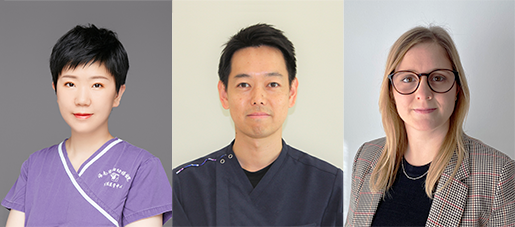

Igenomix亞太區 ( 日本、台灣、中國、南韓以及越南 )誠心的邀請各位前來參與第四屆線上學術論壇。
在這次的論壇中,我們邀請到來自亞太區以及西班牙的頂尖醫師並且分享他們的經驗、新發現、以及成功案例。
如果各位對於演講內容有任何問題,可以在QA環節向講者進行提問喔~
我們期待您的參與!
* 這場活動將全程以英文進行
* 因應現場狀況,主辦單位有權配合調整活動內容



Igenomix亞太區 ( 日本、台灣、中國、南韓以及越南 )誠心的邀請各位前來參與第四屆線上學術論壇。
在這次的論壇中,我們邀請到來自亞太區以及西班牙的頂尖醫師並且分享他們的經驗、新發現、以及成功案例。
如果各位對於演講內容有任何問題,可以在QA環節向講者進行提問喔~
我們期待您的參與!
* 這場活動將全程以英文進行
* 因應現場狀況,主辦單位有權配合調整活動內容


Speaker 1
13:35 – 14:05 CST
ERA, EMMA, ALICE test and recurrent implantation failure: A case series report
Associate Prof. Hoang LE, PhD (Vietnam)
Tam Anh Hospital
According to WHO 2020, there are about 48 million infertility couples in the world currently. In recent years, assisted reproductive technology has been developed strongly and achieved significant milestones. According to Koot 2012, however, there are still about 8-10% of couples with recurrent implantation failure (RIF). One of the reasons, even with the good quality embryo or an euploid embryo transfer, is the abnormal endometrium or related to the implantation window. Thus, it is necessary to use molecular diagnostic tests including ERA, EMMA and ALICE to provide information on the implantation window of the endometrium, microbiome profile and chronic endometritis. At the ART Center of Tam Anh General Hospital in Hanoi, Vietnam, we have applied this trio-tests to patients who have RIF. From March 2020 to February 2022, 17 patients with recurrent implant failures were concurrently tested for ERA, EMMA and ALICE. In 13 patients had embryo transfer after the test, 6 patients got pregnant, in which 1 patient had five previous failures. This is a promising result, opening up hope for patients with RIF. However, the advantage of these tests needs more evidence to confirm.
Graduating from Hanoi Medicine University in Obstetric Surgery in 1990, Assoc. Prof. Le Hoang worked at the National Hospital of Obstetrics and Gynecology (NHOG). In 1998, he was one of the first Northern doctors sent to Thailand to learn IVF techniques. He took a Gynecology and Obstetric intern course in France between 2001 and 2002. From 2011 to 2017, he was the Vice Director of the ART Center of NHOG and became the Vice Director of NHOG from 2013 to 2017.
He has been the Director of the ART Center, Tam Anh General Hospital, since 2017 until now. He is also the Vice President of Ha Noi ART Association, the honorary member of the French College of Obstetricians and Gynecologist (CNGOF), a member of the Executive Committee of Vietnam Association of Obstetricians and Gynecologist, Secretary of Vietnam Society for Reproductive Medicine, and the member of American Society of Reproductive Medicine.

Speaker 2
14:05 – 14:35 CST
Practical application for ERA in Korea
Dr. Chang-woo CHOO, MD (Korea)
Seoul Maria Fertility Hospital
Endometrial receptivity issues represent a potential source of implantation failure. The aim of this clinical study was to evaluate our experience with the endometrial receptivity array (ERA) among patients with a history of repetitive implantation failure.
In recent years, an efficacy of the ERA in Korea has been discussed and debated among physicians. So, I investigated whether the contribution of the endometrial factor could be identified with the ERA test and if actionable results can lead to improved outcomes such pregnancy rate increase.
Today, through a care review, we would like to discuss the practical application of ERA.

Speaker 3
14:35 – 15:05 CST
How to optimize ART success rate in difficult patients
Prof. Chii-Ruey TZENG, MD, MPH (Taiwan)
Taipei Fertility Center
TBC

Speaker 4
15:05 – 15:35 CST
Clinical Application of EndomeTRIO in RIF Patients
Dr. Zhi ZHOU, MD (China)
Hainan Province Maternal and Children’s Hospital
Efficacy of EndomeTRIO and reproductive outcome improvement of RIF patients with real cases and data.

Speaker 5
15:35 – 16:05 CST
Does the ERA test create a new era in ART ?
Dr. Noritoshi ENATSU, MD, PhD (Japan)
Hanabusa Women’s clinic
Assisted reproductive technology (ART) has evolved since 1978, and some new technologies pushed the technology up to new era. The biggest change in 2000s is brought by the clinical use of preimplantation genetic test (PGT). PGT increases clinical pregnancy rate and reduces spontaneous abortion per embryo transfer. Therefore, the relative importance of implantation failure has become greater. ERA test has been reported to be effective in case of implantation failure by many researchers. However, some researchers also reported the effectiveness as still sceptical. In this session, we want to confirm how effective is ERA test and how to use it in clinical management.
Dr Enatsu graduated from Kagoshima University and was awarded an MD in 2005. He completed his clinical training in urology in 2011 in Kameda Medical Center, and received a PhD in reproductive medicine from the Kobe University, school of medicine in 2015. He has been working for infertile couples (both men and women) at Hanabusa Women’s Clinic since 2018.

Speaker 6
16:05 – 16:35 JST
Endometrial microbiota composition is associated with reproductive outcome in infertile patients
Dr. Iolanda García, PhD (Spain)
Igenomix Spain
Previous evidence indicates associations between the composition of the female reproductive tract microbiome and reproductive outcome in infertile patients undergoing assisted reproduction. We performed a multicentre prospective observational study using 16S rRNA gene sequencing to analyze endometrial fluid and biopsy samples before embryo transfer in a cohort of 342 infertile patients undergoing assisted reproductive treatments.
A dysbiotic endometrial microbiota profile composed of Atopobium, Bifidobacterium, Chryseobacterium, Gardnerella, Haemophilus, Klebsiella, Neisseria, Staphylococcus and Streptococcus was associated with unsuccessful outcomes (no pregnancy, biochemical pregnancy, and clinical miscarriage). In contrast, Lactobacillus was consistently enriched in patients with live birth outcomes. These findings indicate that endometrial microbiota composition before embryo transfer could be a useful biomarker to predict reproductive outcome, offering an opportunity to further improve diagnosis and treatment strategies.
Dr. Iolanda García Grau graduated in Biotechnology in 2014 and with a master’s degree in Biochemistry, Molecular Biology and Biomedicine. In 2016, she started in the field of Reproductive Medicine and received a University Teacher Training (FPU) grant from the Spain Ministry to perform a PhD in Biomedicine and Biotechnology at the University of Valencia and Igenomix Foundation, being part of the research group led by Dr. Carlos Simón Vallés and Dr. Inmaculada Moreno. Her thesis focused on the analysis of the endometrial microbiome and its impact on human reproduction.
Dr. Iolanda García Grau has participated in several scientific publications and has attended numerous national and international congresses. In 2020, she derived her professional career to clinical diagnosis as EndomeTRIO Specialist at Igenomix HQ, evaluating both endometrial receptivity and microbiome.

Facilitator
Viviane Casaroli
Igenomix APAC
Igenomix
- with science on your side,
以最專業的科學支持生殖醫學的未來
我們致力於創造一個生育不再是難題的世界。與世界各地的醫療機構和生育專家一起,我們正和想懷孕的夫婦一起,改變人類的生命。